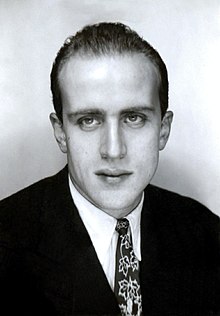Boris Vian
| Boris Vian | |
|---|---|
 |
|
| Born |
10 March 1920 Ville-d'Avray, Hauts-de-Seine, France |
| Died | 23 June 1959 (aged 39) Paris, France |
| Pen name | Vernon Sullivan, Bison Ravi, Baron Visi, Brisavion |
| Occupation | Novelist, playwright, journalist, engineer, musician, songwriter, singer |
| Nationality | French |
| Alma mater | École Centrale Paris |
| Notable works |
L'Écume des jours J'irai cracher sur vos tombes L'Automne à Pékin L'Herbe rouge L'Arrache-coeur |
| Website | |
| borisvian |
|
Boris Vian (French: [bɔʁis vjɑ̃]; 10 March 1920 – 23 June 1959) was a French polymath: writer, poet, musician, singer, translator, critic, actor, inventor and engineer. He is best remembered today for his novels. Those published under the pseudonym Vernon Sullivan were bizarre parodies of criminal fiction, highly controversial at the time of their release.
Vian's other fiction, published under his real name, featured a highly individual writing style with numerous made-up words, subtle wordplay and surrealistic plots. His novel L'Écume des jours (literally: "The Foam of Days") is the best known of these works and one of the few translated into English, under the title of Froth on the Daydream.
Vian was also an important influence on the French jazz scene. He served as liaison for Hoagy Carmichael, Duke Ellington and Miles Davis in Paris, wrote for several French jazz-reviews (Le Jazz Hot, Paris Jazz) and published numerous articles dealing with jazz both in the United States and in France. His own music and songs enjoyed popularity during his lifetime, particularly the anti-war song "Le Déserteur" (The Deserter).
Vian was born in 1920 into an upper middle-class family in the wealthy Parisian suburb of Ville d'Avray (Hauts-de-Seine). His parents were Paul Vian, a young , and Yvonne Ravenez, amateur pianist and harpist. From his father Vian inherited a distrust of the church and the military, as well as a love of the bohemian life. Vian was the second of four children: the others were Lélio (1918–1984), Alain (1921–1995) and Ninon (1924–2003). The family occupied the Les Fauvettes villa. The name "Boris" was chosen by Yvonne, an avid classical music lover, after seeing a performance of Mussorgsky's opera Boris Godunov.
...
Wikipedia
